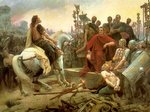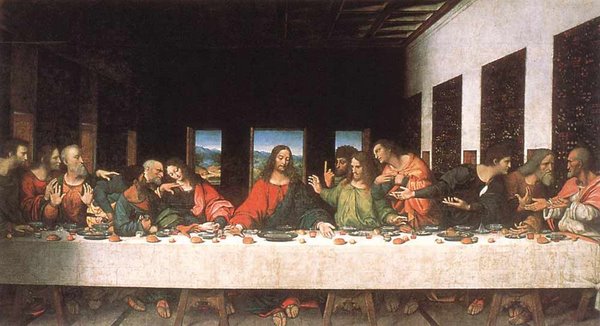
I'd like to warn you, this is a long one. In February I was stunned by some things that happened in Catania, a city in Sicily that is very close to where my family is from. In fact, I'm pretty sure I have relatives living in Catania right now. So I wrote this 2500 word essay about soccer violence, which I am now posting here...so good luck, it's a long one:
The recent death of an Italian police officer in the aftermath of a soccer game has led me to ask some serious questions to which there are no sufficient answers. How could this happen? Why did it happen? Is this kind of situation preventable, and if so, at what cost? The issue of soccer related violence in Europe, and more particularly in Italy, is a complex one, and I’d like to examine it in some depth here. I hope this will lead both myself, and others to a better understanding of at least some of the implications and complications of hooliganism and violence in the western world.
First, it must be said that violence and soccer have gone hand in hand for generations, and thus, is not a new phenomenon. As the world game, soccer has come to be one of the most intense and universal mediums of cultural expression worldwide. From Ukrainian communism to Brazilian samba music, there is no limit to what soccer can represent. Unfortunately, as such a perfect mirror of humanity, soccer also represents and embodies the darker side of human nature. Racism, homophobia, exploitation, and murder accompany soccer’s more uplifting aspects wherever it is played. Fan violence and hooliganism are the most widespread of the negative aspects of the beautiful game, and it is these that have appeared most commonly in the news in recent months. What must be taken into account, however, is that the roots of soccer violence rarely lie in the game itself. More commonly, soccer becomes a relatively acceptable means to vent frustrations, partake in controlled chaos, and prosecute ancient vendettas.
Which brings us to Sicily, and the events of the Catania-Palermo game. What makes educated people in a modern western nation (not to mention a G7 nation and founding member of the European Union) throw homemade grenades with the intention of maiming their countrymen? I have my own theory, but first I’d like to examine a few of the most common explanations:
(1) SOCCER VIOLENCE IS EUROPE’S VERSION OF NORTH AMERICAN GANG VIOLENCE: Admittedly, there is some merit to this idea, and if it was the whole story then soccer violence could be looked upon as the lesser of two evils. Compare hundreds of gang related deaths in any North American city to the one or two soccer related deaths in any European city and you’ll see what I mean. The only problem with this explanation is that it ignores a few very important facts. Gangs still exist in European cities, although they are mostly replaced by soccer supporters’ clubs. Also, many of the hooligans are led by middle-aged men, thus straining the comparison with youth violence in North America. Regardless, I still think that a large percentage of soccer violence can be attributed to hooligans being a slightly more refined version of our gangsters (in that they rarely kill each other) and so in this respect, it just may be better for Europe than North American-style street gangs.
(2) SOCCER VIOLENCE IS COMMITTED BY A FEW BAD PEOPLE AND DOES NOT REFLECT POPULAR SENTIMENT: This idea, while appealing to our moral sensibilities, is not strictly true. I’m not sure when I last considered a few thousand people to be synonymous with just a few. The truth is, soccer violence and its supporters are far more widespread than many Europeans like to admit. For every hooligan throwing a rock, there are ten people cheering him on, and for every group of Ultras (as Italian fan clubs/hooligans are called) there is a cultural space in which they are accepted, and even idealized. All too often hooligans are looked upon with indulgence by others as “passionate lads” or “hard men who fight for what they believe in”. By ignoring the more brutal activities hooligans engage in, people are able to view them with a sort of nostalgia and naivety that legitimizes them and their actions. Also, hooligans are looked up to as folk heroes by thousands of young boys wanting to fit in with the “cool” kids. With such widespread support, even if it is for an imagined hooligan rather than a real one, it is impossible to assume that soccer violence is perpetuated by only the small few who actually throw the punches. On the contrary, it is deeply ingrained into many aspects of wider European culture. -As a side note, the huge success of hooligan literature and films provides quantifiable evidence for the validity of this argument.
(3) SOCCER VIOLENCE IS TRIBAL IN NATURE AND REFLECTS ANCIENT PREJUDICES, HATREDS, AND RIVALRIES: Of all the common explanations for soccer violence, this one holds true the most often. In fact, this has become the most widely accepted view concerning hooliganism worldwide. Take a quick look at some of the more intense rivalries around Europe and you’ll see why this idea is so popular. In Glasgow, the Celtic-Rangers rivalry represents hundreds of years of religious strife. Many clubs in Spain, including Barcelona, Espanyol, Real Sociedad, and Athletico Bilbao have become the spearheads of separatist movements, and teams from the Spanish capital of Madrid are met with flares and rocks whenever they travel to these regions. In Milan the Internazionale-AC Milan rivalry is political, pitting the left wing (Inter) against the right wing (AC Milan). The list goes on and on, but the conclusion is the same: Most soccer violence has its roots in something other than soccer, and the game merely provides an outlet for otherwise unrelated issues to be fought over, be they tribal, political, religious etc. This, however, can also be a positive aspect of soccer violence. How much better is it for Red Star Belgrade fans to fight Croatian supporters in the stadium than it is for them to go to war and massacre those same Croats? Pursuing tribal hatreds through soccer leads to far fewer deaths than pursuing them through state-sponsored ethnic wars. So I guess even this isn’t as bad as it could be.
Having reflected on these ideas, let us look at Sicily’s case in particular. First and foremost I would like to say that there are three people/groups of people responsible for the death of Filippo Raciti, and all must be brought to justice if his death is not to be in vain. Obviously the enraged Catania fans who rioted both during and after the game are most at fault, particularly the anonymous man who made an explosive at home and used it to murder a 38 year old father of three. This action is inexcusable, and though I myself am a huge Catania fan, I feel that serious sanctions must be taken against the club in order to get their supporters in line. Secondly, the authorities in charge of the match itself have a lot of explaining to do. Palermo and Catania’s mutual hatred goes back about 1200 years to the Arab invasion of Sicily and their creation of Palermo as the island’s capital. The last time these two teams met – in Palermo last September – around 100 Catania fans caused complete havoc, with fires, injuries, and the military police getting involved. How much more damage would 30,000 Catania fans do? Also, the last time a Sicilian team - Messina - visited Catania there was enough violence for the Italian soccer federation to sanction the club and prevent them from playing matches at home for about a month. Any intelligent person would conclude that explosive violence would accompany the Catania-Palermo match, and so the authorities are to blame for not putting in place better security measures, or even having the game played in a stadium outside of Catania. Finally, Mr. Farina, the game’s referee, must also face some sort of justice, as the riot that cost officer Raciti his life was a direct result of two disgusting calls he made during the match. Palermo won the game 2-1. Their first goal was clearly offside, and yet it was allowed. As offside calls are often misjudged, this could be forgiven. In light of the second goal however, it could not be. Palermo’s second goal was scored by Davide di Michele’s hand, and it was so obvious that one must question where exactly the referee’s paycheck was coming from. I know, blaming the referee for the fans’ response seems childish, but after having to delay the game due to tear gas wafting onto the field, and watching as dozens of people were rushed to the hospital, it should have been obvious to him that something was horribly wrong. More care could have been taken by Farina in his decisions later in the match, if only to defuse an already volatile situation. I wonder what went through his mind when he watched the replay on the news that evening, after the nation knew that a man had lost his life.
Having examined the general ideas concerning hooliganism, and the specific circumstances leading to the rioting in Catania, I would like to put forth my own theory to explain the escalating violence centred around soccer in modern European nations. Before I explain it though, I would like to describe how I came up with it. First of all, it is no secret that international soccer games tend to bring out nationalist sentiments in certain fans, who then attack the supporters of the “enemy” nation’s team. In this context, violence is often seen as legitimate because it is used in defence of one’s nation in the face of foreign opposition. Essentially, the fans get caught up in the moment and rational judgement gives way to mob violence fuelled by patriotism. In this violence, they find confirmation of their own national identity and, by extension, their personal identity as well. This is what is occurring when England fans throw chairs at non-British (and usually non-white) supporters while singing “Rule Britannia” and “God Save the Queen”. Secondly, I recently read Franklin Foer’s excellent book “How Soccer Explains the World” in which he uses soccer in all its highs and lows as a case study for globalization and regional resistance to it. This got me thinking more about regionalism, nationalism, globalization, and how the average person relates such ambiguous concepts to their daily lives. Finally, I noticed that the most intense soccer violence in recent years has occurred in very specific areas, namely those that have experienced crises over national identity within the last fifty or so years. Here is a long, but nowhere near exhaustive list of some of the more explosive rivalries: Czechs vs. Slovaks, Eastern Ukrainians vs. Western Ukrainians, Croats vs. Serbs, Macedonians vs. Greeks and Serbs, Basques and Catalans vs. Spanish, Protestants vs. Catholics throughout the UK, ethnic French teams vs. French teams supported by minorities, and Sicilians vs. Italians. It quickly becomes clear that there is something going on in these areas that goes beyond the obvious explanation of traditional ethnic hatreds and the extension of political rivalries into soccer rivalries. This new problem occurs at the level of the individual, and only turns into widespread rioting when many individuals feel the same way at the same time and decide to take some sort of action. This new and dangerous issue, I believe, is related to the curiously modern problem of identity.
Now that I’ve ranted for a while, here is my theory: The new and escalating violence centred in and around soccer stadiums in Sicily (and other European regions as well) is a form of protest against globalization, and resistance to the loss or compromise of already fragile and uncertain regional identities. The issue of identity in the modern world is rather too complex for me to get into here, but a quick summary of it should suffice. Though both national and ethnic identities are essentially constructed, they have become essential to the way people define themselves. When traditional identities are challenged, or when new ones are imposed, the situation becomes dangerous, and violence, or some other form of active resistance, is all too common. For a chilling example of what I mean, look no further than Rwanda, where a single ethnic group was splint into two by foreign invaders, resulting in the worst genocide of our time. The situation in Sicily, though less intense, has a lot to do with a regional identity crisis. Sicilians are quite different ethnically from most Italians, yet they are considered Italian by the rest of the world due to the Island being under the political rule of Italy. This would not be such a bad situation if their ethnic identity remained intact, but for close to one hundred years the Italian government actively attempted to assimilate Sicilians into the mainstream of Italian culture, even going so far as to ban teaching of the Sicilian language in schools (Can you imagine if the Canadian government banned Quebec from teaching French in school?). This government intervention created a long-standing cultural resistance within Sicily that erupted in violence numerous times in the twentieth century. Luckily, the Italian senate recently gave Sicily regional autonomy, and the crisis seemed to have been averted. Unfortunately – depending on your point of view – globalization has swept into Sicily in the form of European Union mandates. Now the challenge to Sicilian identity has re-emerged, bringing with it a renewed state of cultural resistance. The only place this resistance in not met immediately by police and other authorities is within the soccer stadium, where such resistance is usually explained away by the common ideas I discussed above. This relative freedom of expression found in the stadium thus provides a safe forum in which political resistance can be expressed without the imminent risk of jail time.
Thus when Italian – or even other Sicilian – teams travel to Sicily, the soccer stadium becomes the focal point for the defence of regional identity and a forum for both political and cultural resistance. That this resistance takes such a violent form can perhaps be explained by the above discussion on the nature of soccer violence, as well as the fact that political activism in Europe has traditionally been extremely violent (the record of European wars and revolutions speaks for itself). Obviously I’ve left a lot out of this discussion, and it’s more of a rant than an academic work, and some of my logical leaps may not follow easily from A to B, but it’s still a work in progress, so if you have any comments, criticisms or questions I would love to hear them. Thanks for your time, and please remember the family of Filippo Raciti.
























